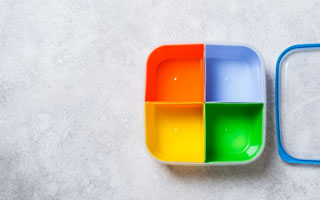Food Contact Materials Testing

What links the following items?
- The machinery that processes food
- The packaging that carries food
- The equipment used to store, cook and eat food
They are all food contact materials (FCM) and must demonstrate compliance with local requirements to ensure they are safe to use.
What are FCM?
Defined as materials or products intended to come into contact with food and beverages, FCM are already in contact with them, or may reasonably be expected to come into contact with them. FCM can be found in the machinery that processes our food and beverages, the packaging that carries them, and the equipment we use for storage, cooking and eating food and drink.
FCM must not change the food and drink they are in contact with or endanger human health. Globally, different markets maintain their own FCM regulations to prevent products being placed on the market which alter our food or drink, bring about a deterioration in its organoleptic characteristics, or release hazardous substances.
SGS’s global network of laboratories can support your products' compliance with the FCM regulations governing your target market.
FCM Regulations Requiring Accredited or Recognized Labs
Complying with technical specifications alone may not be sufficient to place FCM on certain markets. These jurisdictions have implemented strict measures and controls by only recognizing designated laboratories to conduct testing and/or certification bodies (CB) to certify the FCMs comply before allowing these products to access their markets.
Regional Regulations

Europe
In EU countries, Regulation (EC) No 1935/2004 provides the general framework for FCM. Some products may also come under the scope of harmonized measures for ceramics, regenerated cellulose films and various types of plastic. Not all FCM have harmonized measures, however, manufacturers must still assure the safety of products placed on the market.
European countries not in the EEA are not bound by EU regulations but may use them as a guide.

USA
FCM are regulated in the USA by Title 21 of the Code of Federal Regulations (CFR). Stakeholders should also be aware of local prescriptions on FCM, including state specific requirements on bisphenol A (BPA) and per- and polyfluoroalkyl substances (PFAS), state and county specific regulations on children’s products. Suppliers working in California also need to be aware of settlement agreements reached under California Proposition 65.

Canada
FCM are regulated in Canada by the Consumer Product Safety Act (CCPSA). To gain compliance, manufacturers should also be aware of regulations relating to asbestos, glazed ceramics and glassware, infant feeding bottle nipples, kettles, phthalates, and surface coating materials.

Mercosur
Like EU and US regulations, FCM sold in Mercosur markets need to comply with its general safety requirements, GMC Resolution Number 3/92. They must also conform to resolutions covering glass and ceramics, elastomers, adhesives, polymeric and resinous coatings, metals and alloys, and resolutions for plastic additives and colorants. Each member country of Mercosur is required to transpose these decisions and protocols into national law.

Asia Pacific
FCM regulations in the Asia Pacific Region are complex. Without a single common market, jurisdictions maintain localized regulations, some of which are based on requirements from other regions. Stakeholders are advised to consider the regulations that pertain specifically to their target market to ensure compliance.
Webinars

Food Contact Materials - Understanding Mercosur/Brazil Requirements

Food Contact Materials - Understanding Chinese Requirements and Differences to the EU & US

Food Contact Materials - Understanding EU Requirements

